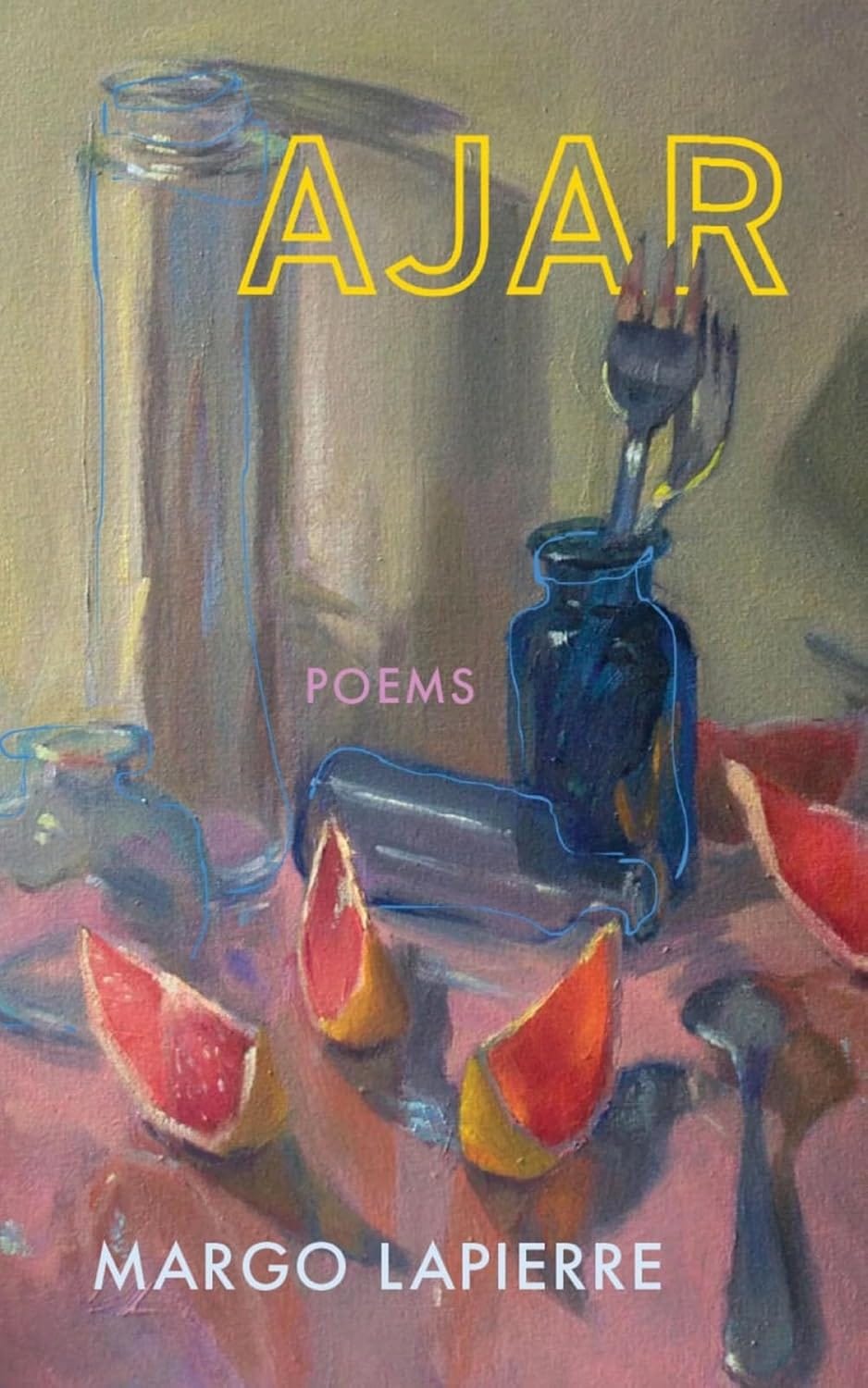Ajar: Poems by Margo LaPierre
Reviewed by Dawn Macdonald
“I haunted me,” writes Margo LaPierre, a phrase that reverberates through her sophomore collection Ajar. The haunting in LaPierre’s work manifests as altered mental states, as suicidal ideation, the vertigo of swaying at the brink of imminent disembodiment.
Ajar interleaves short lyric and prose poems with brief, untitled evocations appearing alone on the page in italic font, echoing the refrain of haunting: “The future predicted itself, and I haunted me, / Briefly I thought other ghosts haunted me, but it was just me.” The work taken as a whole may appropriately be described as harrowing. LaPierre tells in some detail of her multiple suicide attempts, the physicality of self-harm, and the vivid distortion of psychosis. At times, she operates in an analytical mode, setting forth hypotheses such as, “When our minds go, they go calm. The calm leaps into / unknowns as though to be human were to be bread, sliced / and bagged. What are we but eager to be swallowed?” Another example of this style arises in the prose poem “Circuits” which begins, “Perception, in whatever sensory modality, is the result of the / brain’s cartographic skill. The brain maps the world and it / maps the body. These maps, and the relationships between / them, form the perceptual content of our lives.”
At other points, she uses surrealist imagery to articulate a melting of mind, body and self into object and other, as in the poem “Blackberries” where “A grasshopper thuds in flight: my scapula. / My shoulder aches thanks to pavement’s pull. / My tibia: a mongoose hiding in all this flesh, / hoarding eggs. My throat: a highway, surging. / So why can’t I speak? … / My kneecaps are heartbeats, hibernating bears.” The poems frequently invoke non-human living things, including fruits and flowers as well as animals. In the remarkable visual poem “The Grapefruit: A Model of Time Squeezed through Consciousness” she presents a diagram relating the moment of death to “a halved grapefruit pressed against a screen door.”
The moon and the planets are treated as mythic persons within the poems. In a piece describing an episode of attempting to overdose on assorted medications outside a convenience store, LaPierre writes that “The moon, ajar, swallows pills / in the vertical light …,” and later in the same poem, “The moon’s mouth is a lake expanding / into recesses, other sides / never lit, a thousand potato eyes / a mouth and hands converging / where the sick // exits then enters ….” Ultimately, “The moon couldn’t dip low enough to hide / like an injured animal bows its head / to greet death, alone”.
The theme of interconnection is underscored by LaPierre’s choice of the cento form for several pieces in this collection. The cento is a collage-style work where each line is taken verbatim from another writer’s published material. LaPierre provides seven pages of acknowledgements for these sources at the back of the book, and has drawn widely from across the Canadian poetry lanscape. Lines are credited to Frances Boyle, Chris Johnson, Sonnet L’Abbé, Christine McNair, Klara du Plessis, Stuart Ross, and many others. The book also includes multiple “after” poems. In the prose poem “Overlay” we learn that objects on a chair beside the poet’s bed include a copy of Jessi MacEachern’s A Number of Stunning Attacks.
There is movement through the work toward a potentially life-affirming space, including the possibilities of childbearing. By the end, it is not that the poet is no longer haunted by herself, but perhaps the haunting has expanded outwards, beginning to root itself in place and connection. “My flower sighs haunt the apartment, deathlessly. / Only, this time, there’s a little fish inside me.”
While the printed book does not include an emergency mental health resource listing, the poet’s website does, and so I’ll note it here: “These poems depict suicidality and some of the violences that worsen the risk. In Canada and the US, the suicide crisis helpline is 988 and it’s available 24/7.”
About the Author
Margo LaPierre is a writer and freelance literary editor. With multi-genre work published in The Ex-Puritan, CV2, Room, PRISM, and Arc, among others, she has won national awards for her poetry, fiction, and editing. She holds an MFA in Creative Writing from UBC. Ajar is her second poetry collection.
About the Reviewer
Dawn Macdonald lives in Whitehorse, Yukon, where she grew up without electricity or running water. She won the 2025 Canadian First Book Prize for her poetry collection Northerny. She posts weekly at Reviews of Books I Got for Free or Cheap (on Substack), as well as reviewing for journals and for The Seaboard Review of Books.
Book Details
Publisher : Guernica Editions
Publication date : Oct. 31 2025
Language : English
Print length : 85 pages
ISBN-10 : 1771839880
ISBN-13 : 978-1771839884





